- Home
- Peter Ackroyd
Chatterton Page 9
Chatterton Read online
Page 9
It was Charles. He rarely telephoned Vivien here but, when he did so, he always managed to sound as if he were calling from another country. ‘Hello? Viv? Are you there?’
‘Yes, it’s me. Is there anything the matter?’ All her fears suddenly returned, and she heard the panic in her own voice as she leaned forward across her desk.
Charles did not seem to have noticed it, however. ‘Absolutely not. Everything’s fine.’ She said nothing, and waited for him to continue. ‘I was just wondering,’ he went on, ‘when I was supposed to start working for Harriet Scrope. Did I happen to mention it to you?’
She sensed that this was not the real reason for his call. ‘You were meant to start this morning. I reminded you last night.’
That’s right! I knew I was late for something.’ He paused, trying to gauge her mood. ‘Oh, by the way. Could you pick up the shopping on the way home? Now that I’m busy?’ Vivien agreed that she would. ‘Good. That’s all right, then.’ Charles, clearly relieved at the lifting of this household burden, grew more confidential. ‘I telephoned Flint,’ he said. ‘He asked me round for a drink this evening, actually. Do you mind?’ He made it sound like the most natural thing in the world, although she knew that he and Andrew Flint had not met since their days at university. Since that time Flint had acquired a reputation both as a novelist and as a biographer but Charles had rarely mentioned him, except as the subject of casual jokes with Philip. ‘Just like old times, isn’t it?’ he was saying now to Vivien. There was a note of triumph in his voice, and it was clear to her that the discovery of the Chatterton manuscripts had given him a sudden access of confidence; but she knew, also, that this mood would eventually fade.
‘Why don’t you show him your poems?’ she asked. ‘He might help to get them published.’ There was a silence and Vivien realised, too late, that this was quite the wrong thing to say. ‘Don’t forget Harriet,’ she went on hurriedly. ‘Do you want me to phone her for you?’
‘I can do some things myself, you know.’ And Charles rang off.
Cumberland’s voice startled her. ‘Whenever a man phones the gallery, someone becomes terrifying. He makes strange moaning noises and has to be taken to the park.’ Both partners had silently entered the office.
‘It was only my husband.’ Vivien forced herself to smile.
‘Ah, a husband! I knew a husband once.’
Vivien smiled, more naturally now. ‘They still exist, you know.’
‘We must move in entirely different social circles, Vivienne. I haven’t seen one since the Festival of Britain. And that was in the dark.’
Maitland stuck out his tongue, apparently in distaste, and at this moment Claire came back into the office, half-whispering and half-giggling. ‘There’s a new boy out in the playground.’
‘Oh God.’ Cumberland sometimes tired of her allusiveness. ‘Can someone translate for me?’
Claire seemed offended and added, more briskly, ‘He said his name was Berk. Or Jerk.’
‘Ah, Mr Merk.’ Cumberland sailed out into the gallery, hand outstretched; he always prided himself upon making the right first impression. ‘We were just talking about you.’ Cumberland was clearly expecting him.
‘Yes?’ Stewart Merk took his hands out of the pockets of his baggy linen trousers and sauntered towards Cumberland. ‘Hot stuff,’ he said, looking at the pictures already hanging in the gallery. They were part of an exhibition of abstract art from Poland, which Maitland had organised. ‘A lot of interest expressed, right?’
Cumberland did not detect any irony in his tone, but he could not absolutely discount it. ‘Well, we like them. And Poland is so romantic these days, don’t you think? With all those Catholics and their walrus moustaches?’
‘You mean Lech Walesa?’
‘I was thinking more of the women actually. Vivienne! Notepad!’
Vivien came out of the office and Merk did not bother to hide his interest.
‘Nice chick, yes?’ he murmured to Cumberland.
‘I have never enquired into her origins ’
‘I bet you haven’t.’
‘ but an egg is out of the question.’
And, when they were all seated in Cumberland’s office, he introduced Stewart Merk as Joseph Seymour’s last assistant, who had worked with the artist until his death three months ago; it had been Merk who put up for auction the three oil paintings which Cumberland had purchased, and now he wanted to negotiate the sale of some more. ‘And why,’ Cumberland was asking him, ‘have you avoided Sadleir? He was Seymour’s dealer, after all.’
‘Okay. Fair comment.’ Merk was admiring Vivien, who was transcribing their conversation in shorthand. ‘I’m not too fast for you, am I?’ He smirked at her before going back to the question. ‘Sadleir is a wally.’
Cumberland was not sure what this meant. ‘That is brutally frank, I’m sure. But can I put my gallery owner’s hat on?’ His hands fluttered towards his head: he was already imagining something black and rather severe, with perhaps a brooch pinned to it. ‘Can I be brutal too?’
‘Go on. I might like it.’
‘How did you acquire these paintings?’
Merk took out a packet of Sobranies, and lit one; Cumberland’s nostrils quivered as he blew a smoke ring into the space between them. ‘Okay. The old man gave them to me. We worked together for some time but you know that, yes?’ Cumberland tried to feign surprise, but in fact he was quite aware of Seymour’s working practices and of Merk’s own role. ‘When the old man died, Sadleir was round to the studio straightaway.’
‘That is the trouble with dealers. Death holds no terrors for them. It merely represents a lump sum.’
‘But there was nothing to give him, right? Seymour had left all his last works to me.’
‘So naturally he broke down at the sudden bereavement. For Sadleir, crocodile tears and crocodile shoes are matching accessories.’
‘I was given everything. For services rendered, yes? The old man never liked parting with money.’ Merk blew another smoke ring towards the ceiling, and all four of them watched it slowly ascend before it shook slightly and faded away.
‘But do you have proof…?’ Cumberland was saying.
‘Of ownership? Yes.’ Putting the cigarette in his mouth, Merk took out from his pocket a wad of papers which had been tied with a length of blue tape. He tossed them at Cumberland, who gracefully caught them with one hand. ‘You can check the numbers on the backs of the canvases, right? He was very methodical.’ Merk settled back in the chair and smiled at Maitland, who seemed somewhat alarmed by this attention. ‘I could have gone my own way, years ago. I could have set up on my own and done my own work. I gave him four years of my life, man.’ He leant forward quickly, to stub out his cigarette, and Maitland retreated further into his chair. ‘But I’m going to make it pay now.’ For a moment there was a trace of menace in his voice but then he went on, in his bland London accent, That’s my story, yes?’
‘And what a good story it is.’ Cumberland had been carefully examining the papers which Merk had thrown to him. ‘Almost worthy of the Brothers Grimm.’ He looked across at Maitland. ‘And what does my colleague and dear friend think of it?’ Maitland had taken out a handkerchief, and was wiping the sweat from his forehead. He puffed out his cheeks, and said nothing. ‘Precisely my opinion. Mr Merk ’
‘You can call me Stew.’
‘Stew. We will buy your paintings. We will go on with your story, but only on condition that nothing happens next.’ the sleeper awakes Philip Slack stared at the rows of dark books; then he switched on the electric light above his head, and in its bright circle he could see the red, brown and green cloths of the volumes, their spines dulled and rubbed, many of their titles so faded that only certain letters could be recognised, their edges worn at the top where other people had taken them down to read them. And, beyond this circle of light in which he stood, the books cast intense shadows. He was in ‘the stacks’, the basement of the library in which he
worked, where all the forgotten or neglected volumes were deposited. Some of these had been piled in corners, where they leaned precariously against the damp stone walls of the basement; but some were scattered across the floor, and it occurred to him that they had been dragged from the shelves by vermin before being eaten. Within this place there lingered the musty, invasive odour of decay; but it was a smell which soothed and pleased Philip.
He had come down to see if he could find any references to Thomas Chatterton and, since he suspected that in old books some forgotten truth might be recovered, he placed his trust in the principle of sortes Vergilianae. So now he walked along the narrow pathways between the shelves, turning on the lights as he went, lightly touching the damp spines of the volumes until eventually he took down the one on which his finger had come to rest; the red cloth of its cover was dusty, but when he brushed it with his hand he saw the title very clearly: The Last Testament by Harrison Bentley. It seemed appropriate for his search, and he opened the book. The pages of the novel were slightly soiled, with light brown stains spreading across them in an arc, and when he turned to the frontispiece he saw that it had been published in 1885 by Sullivan and Bridges of 18 Paternoster Square. Philip held it up to his face, as if he were about to devour it, and turned the pages quickly; he might seem slow or hesitant in his dealings with the world, but he always read swiftly and anxiously. He knew that his real comfort was to be found in books.
And so the outline of the story soon became clear to him: the biographer of a certain poet, throughout referred to as K, discovers that his subject, at the end of his life, had been too ill to compose the verses which had brought him eternal fame; that, in fact, it had been the poet’s wife who had written them for him. The plot seemed oddly familiar to Philip but he was not sure if he had read this novel some years before, or if it resembled some daydream of his own. Distracted now, he turned to the last pages of the book and then to the endpaper which contained an advertisement for ‘Mr Harrison Bentley’s most recent publication’. This was entitled Stage Fire and the précis of its plot, in eight point type, summarised the history of an actor who believes himself to be possessed by the spirits of Kean, Garrick and other famous performers of the past and who, as a result, has a triumphant career upon the stage. Once more this story seemed familiar to Philip; he recognised its shape so clearly that he was convinced that he had read it elsewhere and that this was not simply some trick of his imagination. He understood the phenomenon of déjŕ vu but he did not believe that it could be applied to books: how could he trust his reading, if that were so?
He was idly tracing the watermark on the last page with his finger when he remembered: he had read the story of Stage Fire in a novel by Harriet Scrope. He did not recall its title that was not important but it had concerned a poet who believed himself to be possessed by the spirits of dead writers but who, nevertheless, had been acclaimed as the most original poet of his age. And at once Philip remembered where he had read Harrison Bentley’s The Last Testament before: Harriet Scrope had written a novel in which a writer’s secretary is responsible for many of her employer’s ‘posthumous’ publications; she knew his style so well that she was able effortlessly to counterfeit it, and only the assiduous researches of a biographer had uncovered the fakery. This was very close to the late nineteenth-century novel which Philip now held in his hand. He dropped it, and its fall echoed around the basement of the library.
Philip was surprised by his discovery, particularly since he admired Harriet Scrope’s novels. When Charles had first told him that he was going to work as her assistant, Philip had read them avidly and with pleasure; he had been impressed by her combination of violence and comedy although, when he had mentioned this characteristic to Charles, his friend had merely shrugged and said, ‘Fiction is a very debased form’. Philip felt bound to agree Charles, after all, was more creative and imaginative than he was but he was still content to enjoy this lower pleasure.
And so what did Harriet’s borrowings matter? In any case, Philip believed that there were only a limited number of plots in the world (reality was finite, after all) and no doubt it was inevitable that they would be reproduced in a variety of contexts. The fact that two of Harriet Scrape’s novels resembled the much earlier work of Harrison Bentley might even be coincidental. He was less inclined to criticise her, also, because of his own experience. He had once attempted to write a novel but he had abandoned it after some forty pages: not only had he written with painful slowness and uncertainty, but even the pages he had managed to complete seemed to him to be filled with images and phrases from the work of other writers whom he admired. It had become a patchwork of other voices and other styles, and it was the overwhelming difficulty of recognising his own voice among them that had led him to abandon the project. So what right did he have to condemn Miss Scrope?
He picked up The Last Testament and carefully replaced it on the shelf. Then, in order to calm himself after his strange discovery, he took down the small volume next to it. It was a selection of literary reminiscences, edited by the Dowager Lady Moynihan, and at once his attention was drawn to the engraved plates which illustrated the text and which were still protected by the thin, fine tissue common to that period of book production. He looked through them, eventually stopping at one scene which was familiar; and, when he looked down at the legend beneath the engraving, he read ‘Chatterton’s Monument in Bristol Churchyard’. There was a short text on the page opposite the illustration: it concerned the novelist George Meredith ‘who, in the early months of 1856, in the utmost extremity, and with thoughts of self-murder after his wife’s desertion, sat in the gloomy environs of St Mary Redcliffe in Bristol, lo, even in the shadow of Chatterton’s Monument. He had purchased a phial of mercury-and-arsenic with which he intended to end his life but, as he was about to put the deadly flask to his pale lips, he felt a hand laid upon his wrist; looking up, he saw a young man standing over him and forbidding him to drink. When he put down the phial, the young man disappeared. Thus was the young George Meredith saved for literature by the intervention of the ghostly Thomas Chatterton. I do not believe my readers will know of a more chilling and yet more noble story.’ Philip leaned back against the wall of the basement, and tried to imagine this scene…
He was aware that someone was watching him. It was Harriet Scrope and behind her, his face in shadow, was Harrison Bentley. Philip jerked forward and opened his eyes; his throat was dry from sleep, and he could feel the dampness of his shirt where he had been slumped against the stone. There were pools of light among the stacks, directly beneath the bulbs which Philip had switched on, but it was now with an unexpected fearfulness that he saw how the books stretched away into the darkness. They seemed to expand as soon as they reached the shadows, creating some dark world where there was no beginning and no end, no story, no meaning. And, if you crossed the threshold into that world, you would be surrounded by words; you would crush them beneath your feet, you would knock against them with your head and arms, but if you tried to grasp them they would melt away. Philip did not dare turn his back upon these books. Not yet. It was almost, he thought, as if they had been speaking to each other while he slept.
At last he was able to run up the stairs to the main library and, believing that his absence might have been noticed, kept his head bowed and looked down at the blue linoleum floor as he quickly made his way to his desk. Some recently acquired volumes had been placed there for him to catalogue and, as he gradually became absorbed in his work, his anxiety abated. The library was not peaceful but it was a place of somewhat precarious refuge, and by now he was accustomed to the footsteps, the coughing and the occasional muttered voices of those who came to sit here in the early afternoon. And why should he, who knew the comfort of books, deny it to others?
A vagrant was sitting on one of the green plastic chairs in the ‘Reference’ section, quickly turning the pages of a dictionary and talking to himself in a rapid, high voice (and, Phili
p wondered, had he done this as a child?). A middle-aged woman, with an old brown shawl thrown across her shoulders, was kneeling on the floor by the ‘Fiction’ section: she had two books open in front of her, but her tangled hair kept falling across her eyes and she moaned as she swept it back. The staff were used to her presence, however, and made no effort to move her. Close to Philip’s desk was a long table, at one end of which a young man with bright red hair always sat; he had his elbows on the table (there were holes in the sleeves of his jacket, where the fabric had been worn away) and, as usual, he was staring down at an unopened book. Philip had once asked him if there was anything in particular he wanted to read and he had replied, very quietly, ‘Oh no, nothing really.’ And still he came every day. And the smell of the library was always the same the musty odour of old clothes mixed with the keener scent of unwashed bodies, creating what the chief librarian had once described as ‘the steam of the social soup’. Philip recalled a poem in which the world was compared to a vast hospital but what if it were a vast public library, in which the people were unable to read the books? And yet those now around him seemed resigned to this; they were quiet, helpless, and poor. It might have been better if they had risen up in a fury and destroyed the library but, no, they sat here and left at closing time. Even the most deranged of them seemed to be content with that.
Some publishers’ catalogues had been left on his desk, since it was one of his duties to read all the announcements of new books and to order those which seemed most suitable. One of them was a slim list from a university press and, although it advertised books which the library could rarely afford to purchase, he glanced at it with some interest an interest which turned to a sudden start of recognition when he read here of the forthcoming publication of Thou Marvellous Boy: The Influence of Thomas Chatterton on the Writings of William Blake. Immediately beneath the title was an illustration, no doubt by Blake himself, of a young man with his hair flaming, as an emblem of the sun, and with his arms outstretched in greeting. A précis followed: There have been many accounts of Thomas Chatterton’s influence upon the Romantic poets, but Professor Brillo’s study is the first to examine in detail the effect which Chatterton’s ‘Rowley’ poems had upon the vocabulary and prosody of William Blake’s epic verse. Professor Brillo also studies the devices by which Blake introduced the subliminal figure of Chatterton, the suicide, into his texts and discusses the influence of Chatterton’s medievalism on Blake’s own vision. As Professor Brillo states in his introduction, “This is the one subject which Blake scholars have seemed unwilling to address, for it assumes that Blake was influenced by the work of a forger and a plagiarist. But it would not be going too far to suggest that, without the work and the influence of Thomas Chatterton, Blake’s own poetry would have taken a wholly different form”. Homer Brillo is Professor of Advanced Information Studies at Valley Forge University, Wyoming. ‘ Philip remembered the lines which Charles had quoted in the train from Bristol; they had been Blake’s own words, apparently, but they had been signed T. C. But he could not think of this for long: there was a series of bleeps in the far corner of the library; one of the computers had malfunctioned, and was signalling for attention like a wounded bird. The young man with red hair watched him as he rose to rescue it. and still the dream goes on ‘Ah welcome, Charles.’ Andrew Flint greeted him at the door of his flat in Russell Square. ‘Welcome to my dulce domum. My humble third-floor walk-up. Do you know what that signifies in English? I haven’t a conception.’ He had grown fatter in the twelve years since Charles had last seen him, but there was still the same nervous panic in his eyes. ‘Where is the spouse?’

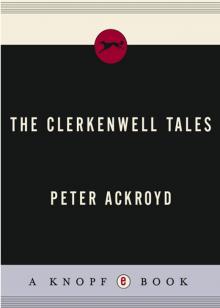 The Clerkenwell Tales
The Clerkenwell Tales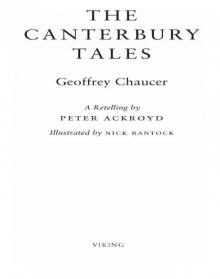 The Canterbury Tales
The Canterbury Tales J. M. W. Turner
J. M. W. Turner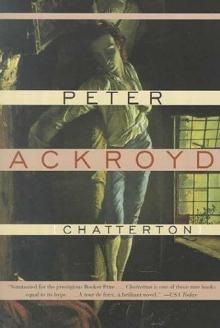 Chatterton
Chatterton The Canterbury Tales – A Retelling
The Canterbury Tales – A Retelling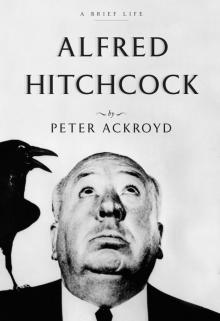 Alfred Hitchcock
Alfred Hitchcock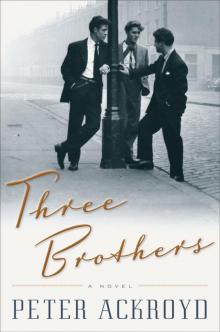 Three Brothers
Three Brothers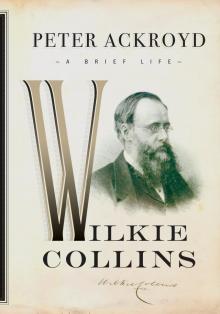 Wilkie Collins
Wilkie Collins Venice
Venice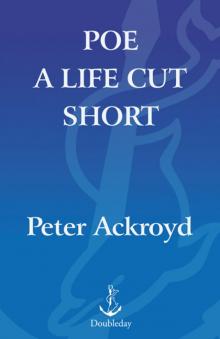 Poe
Poe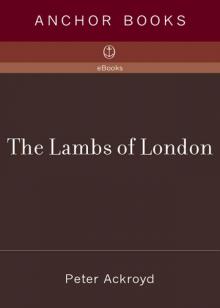 The Lambs of London
The Lambs of London London
London Queer City
Queer City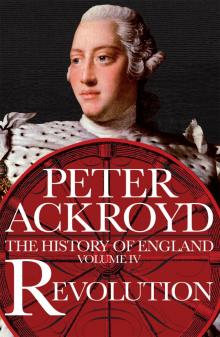 Revolution, a History of England, Volume 4
Revolution, a History of England, Volume 4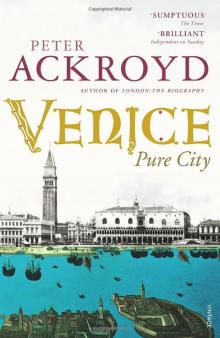 Venice: Pure City
Venice: Pure City Foundation
Foundation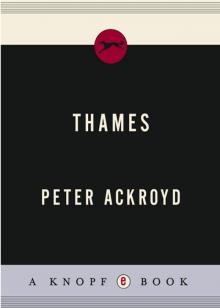 Thames
Thames The Plato Papers
The Plato Papers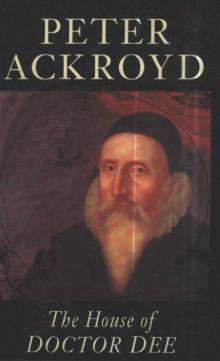 The house of Doctor Dee
The house of Doctor Dee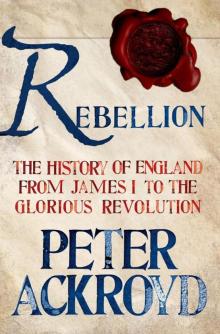 Rebellion: The History of England from James I to the Glorious Revolution
Rebellion: The History of England from James I to the Glorious Revolution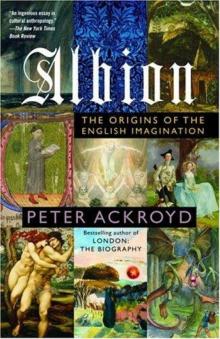 Albion: The Origins of the English Imagination
Albion: The Origins of the English Imagination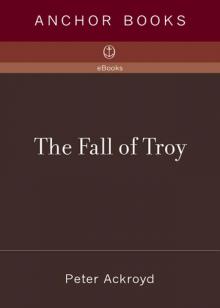 The Fall of Troy
The Fall of Troy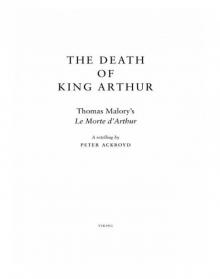 The Death of King Arthur
The Death of King Arthur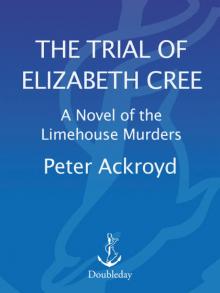 The Trial of Elizabeth Cree
The Trial of Elizabeth Cree London: The Biography
London: The Biography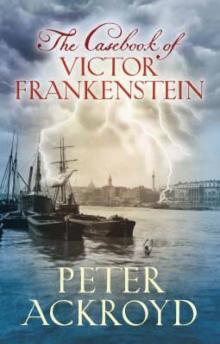 The Casebook of Victor Frankenstein
The Casebook of Victor Frankenstein Hawksmoor
Hawksmoor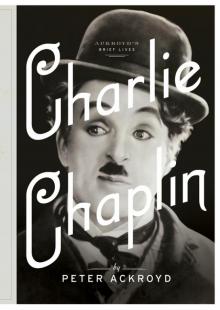 Charlie Chaplin
Charlie Chaplin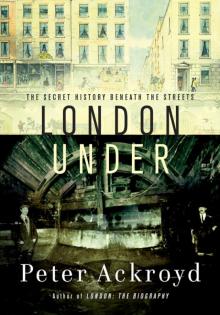 London Under
London Under